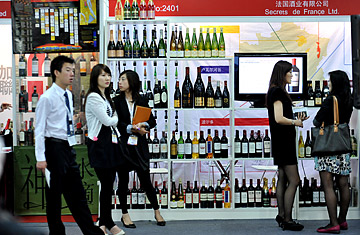
People visit France exhibition area during the Top Wine China 2011 fair at China World Trade Center on May 25, 2011 in Beijing, China.

This post is in partnership with Worldcrunch, a new global-news site that translates stories of note in foreign languages into English. The article below was originally published in Economic Observer.
Yuan Jiang started his first business, a direct marketing services provider called Roadway, in 2001. Seven years later, Roadway ranked first in its sector in China, with profits twice that of its nearest rival. At that moment, Yuan agreed to a merger with the American firm D&B (Dun & Bradstreet) for more than $40 million.
It was 2008, when the financial crisis occurred. There wasnt much hope for my company to be listed, Yuan says.
Yuan Jiang thought it best to use his experience with Roadway to go into B2C (business-to-consumer) commerce. But he still needed to pick a product. After flirting with several ideas, Yuan decided on wine mostly because of its high profit margin. In China, a bottle of French or Italian wine that costs 3 euros from a European winery will be sold for about 11 euros retail. And in a restaurant or bar it can go for three to four times higher.
I had some competitors in 2008. But the crucial point is that wine was small change compared to other consumer items. A lot of middle class families had already started to drink wine, but not yet in way where it had become a fixed part of their expenses.
Yuan did some simple calculations, and decided the numbers were right for him to jump in headfirst. He was most definitely on to something. Through his 4 million-member website, yesmywine.com, Yuan enjoys average sales of 10,000 bottles per day.
The real challenge, as with all B2C commerce, is figuring out how to deliver the product. With wine its more challenging still. Big distribution companies are not interested in delivering wine. Its heavy and fragile, so we are obliged to use small companies. Still, breakages are inevitable. After improving the packaging six times, yesmywine has been able to reduce the breakage rate to less than 2%.
How to keep your clients? A social solution
Yuan Jiang is now working on building up his own distribution system to guarantee the quality of his wine. He also already established his own delivery service for the central Shanghai area. His delivery truck is equipped and air-conditioned like a wine cellar to guarantee the wines quality and taste. Starting in August, his team in Beijing will follow suit, then Shenzhen and Guangzhou. Hed eventually like to cover the entire Chinese market with his own distribution system.
And why should a customer come to me at all if he can buy his wine anywhere else? What else can I provide to my customer apart from being cheaper? Until last year, this was the one question that haunted Yuan how to keep his clients faithful.
The answer to that question came in the form of a microblog, called My Cellar, which Yuan embedded into his website. Visitors can open their own accounts to the blog and thus display their wine cellars and share their appreciation of wine with other connoisseurs. As a result, Yuan has developed not only a large customer base, but also a faithful wine-loving community.
While the members are interacting, the bloggers questions and responses also attract the attention of non-members. This idea of gaining customers through existing customers is what Yuan is most proud of. No wonder, in comparison to other competitors, he spends a lot less in advertising.
Yuan often describes himself as a lazy ant, a concept he borrowed from a book he read about management. The books message was: you have to be lazy about details in order to save time for diligent thinking. Yuan says the My Cellar idea was the product of just that kind of reasoning.
Yesmywine also sells tea. Yuan had the ambition create a yesmyX series of products. I thought it would be difficult to maintain a business in a vertical market. I was afraid the company would get stuck in a bottleneck after reaching a certain size.
But, as his wine business expanded quickly, Yuan decided in the end to keep his focus just on wine. It would be quite difficult to run a multi-line company since each line is in essence an individual business. The tea side of things is currently being sold off. The lazy ant is now concentrating.
Yuans current annual sales in the 20-30 million euro range. By 2013 hes hoping to surpass the 100-million-euro mark. Thats when Ill consider going for a stock listing. The venture capitalists are already lining up outside his door.
Also from Worldcrunch:
Human Trafficking in the Middle East
— Die Welt
Food Safety Scares in China Prompt Government to Choke Press Freedom
— Economic Observer
Surviving a Night in Zurich's Worst Hotel
— Tages
Anzeiger
